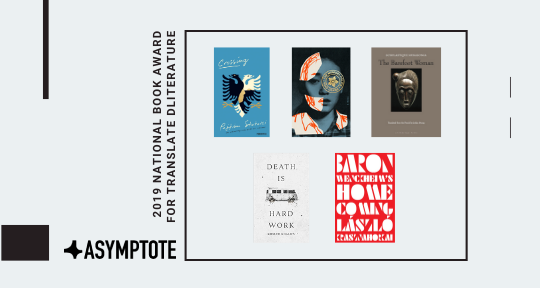As both writers and readers anticipate the results of the National Book Awards this upcoming Wednesday, we at Asymptote, to no surprise, are keeping a particular eye out for the outcome of the Translated Literature category. In this following essay, Assistant Editor Erik Noonan gives us a probing and interrogative look at the five books on the shortlist, looking beyond content to pursue answers regarding the linguistic journeys that these works have taken, in order to be chosen.
With the reinstatement of the Translated Literature category, the National Book Foundation is clearly attempting to correct the gender and culture biases of years past. From the beginning of the category in 1967 until 1983, when it was discontinued, every winning author was European with only four exceptions: Yasunari Kawabata in 1971, the anonymous author of The Confessions of Lady Nijo in 1974, the anonymous Chinese author(s) of Master Tung’s Wester Chamber Romance in 1977, and Ichiyō Higuchi with the Japanese authors of the Ten Thousand Leaves anthology in 1982. Lady Nijō and Higuchi were the only two women, albeit long deceased, to be awarded during the prize’s first iteration. Among the translators, Karen Brazell and Helen R. Lane won in 1974, Clara Winston won with Richard Winston in 1978, and Jane Gary Harris and Constance Link won in 1980. The rest were male. In 2018, the category was reinstated and the entry criteria revised, so that both the author and the translator had to be alive at the beginning of the awards cycle to qualify. Last year, the first of its new phase, author Yōko Tawada and translator Margaret Mitsutani took the award for The Emissary. This year, you can expect this corrective trend to continue (for example, every book on the longlist was written in a different language). READ MORE…

